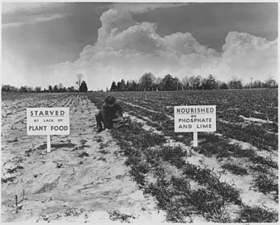Soil Science Society of America
5585 Guilford Road • Madison, WI 53711-5801 • 608-273-8080 • Fax 608-273-2021
www.soils.org
Twitter | Facebook
NEWS RELEASE
Contact: Hanna Jeske, Associate Director of Marketing and Brand Strategy, 608-268-3972, hjeske@sciencesocieties.org
Why do soils need amending?
August 1, 2016 – The soils in which we grow food needs to be fed—and fed the right nutrients! The Soil Science Society of America (SSSA) August 1 Soils Matter blog post explains how soils change over time and use, and how precise soil nutrition can make a difference.
 “Plant life, whether trees, grass, flowers or field crops depends on soil to provide its nutrients,” says Dave Mengel, agronomist and certified crop adviser. ”But, along with weathering, plants use up nutrients, and don’t usually replace them. The more intensively crops are raised, and the greater portion of the plant removed, the faster soils become depleted of natural fertility.”
“Plant life, whether trees, grass, flowers or field crops depends on soil to provide its nutrients,” says Dave Mengel, agronomist and certified crop adviser. ”But, along with weathering, plants use up nutrients, and don’t usually replace them. The more intensively crops are raised, and the greater portion of the plant removed, the faster soils become depleted of natural fertility.”
Soil tests can help determine what your soil needs. Using this information, farmers and gardeners can choose products that provide just the right nutrients. This avoids wasteful application of unnecessary products and reduces pollution.
“Growers can determine the right mix of manures, compost or fertilizers to ensure the right amounts of nutrients are applied, and over application of others is avoided,” Mengel says.
To read the entire blog post, visit http://soilsmatter.wordpress.com.
Follow SSSA on Facebook at https://www.facebook.com/SSSA.soils, Twitter at SSSA_Soils. SSSA has soils information on www.soils.org/discover-soils, for teachers at www.soils4teachers.org, and for students through 12th grade, www.soils4kids.org.